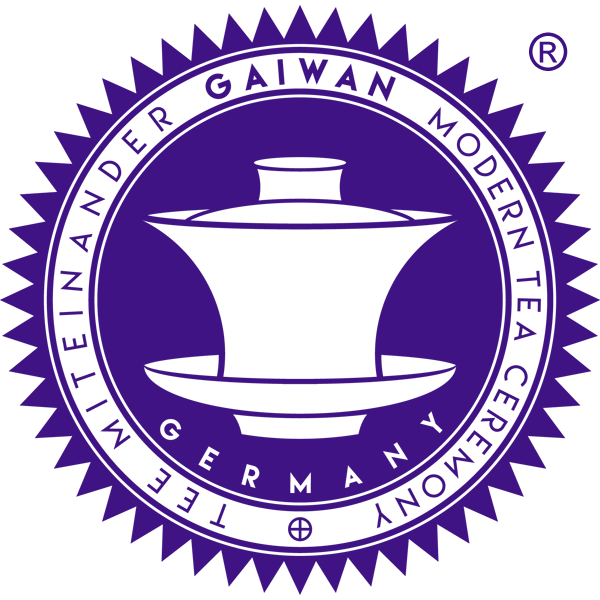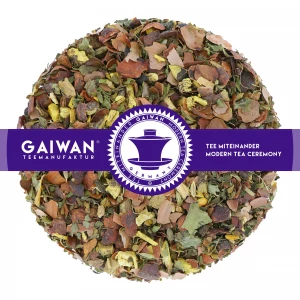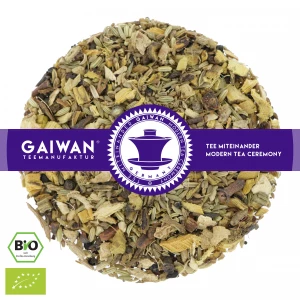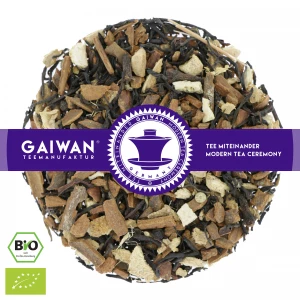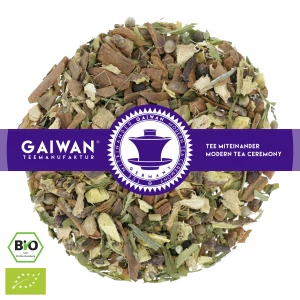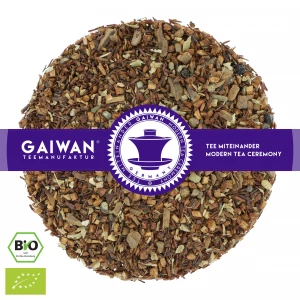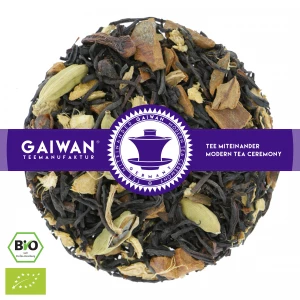Spice Tea, Masala, Chai, Yogi, Ayurveda: What is What?
Spiced tea is, who would have guessed, tea that consists of different spices or has spices added to it to create a unique taste experience. Perhaps you can't think of that many examples. But perhaps you immediately think of chai, masala, Ayurvedic blends or yogi tea? Many people are confused about the terms and any similarities and differences. In this article, we would therefore like to shed some light with a few definitions and explanations. Why not enjoy the reading with a delicious cup of Chai Classic?
Continue reading:
-
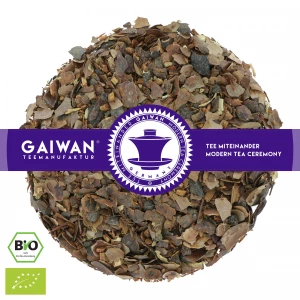
Out of stock
Taste: sweet, full, rounded
Preparation: 3-4 teaspoons (10-12g) per 1 L (13.8 fl oz) of water (100°C | 212°F), brewing time: 3-5 minutes.
Ingredients: cocoa shell¹, rooibos¹, cassia¹, ginger¹, cardamom¹, black pepper¹, cloves¹, natural flavour. Ingredients¹ from controlled organic cultivation. Learn More -
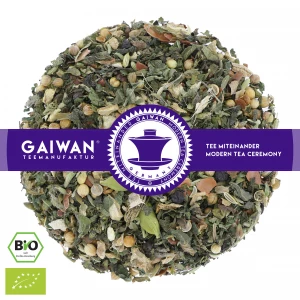
Out of stock
Taste: tingly, tangy
Preparation: 4-5 teaspoons (10-15g) per 1 L (13.8 fl oz) of water (100°C | 212°F), brewing time: 4-5 minutes.
Ingredients from controlled organic cultivation: ginger, nettle, fennel, coriander, black pepper, lemon balm, chocolate shell, cardamom. Learn More -
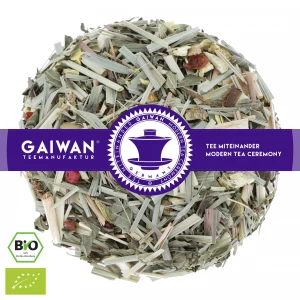
Out of stock
Taste: refreshing, aromatic
Preparation: 4-5 teaspoons (10-15g) per 1 L (13.8 fl oz) of water (100°C | 212°F), brewing time: 4-5 minutes.
Ingredients from controlled organic cultivation: lemongrass, peppermint, cardamom, licorice, rose hip, orange peel, ginger, red pepper. Learn More -
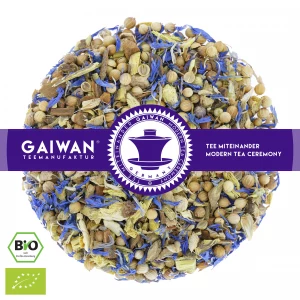
Out of stock
Taste: smooth, soft, mild
Preparation: 4-5 teaspoons (10-15g) per 1 L (13.8 fl oz) of water (100°C | 212°F), brewing time: 4-5 minutes.
Ingredients from controlled organic cultivation: coriander, licorice, cassia, ginger, anise, cornflowers. Learn More -

Out of stock
Taste: sweet, full, fresh
Preparation: 4-5 teaspoons (10 -15g) per 1 L (13.8 fl oz) of water (100°C | 212°F), brewing time: 5-7 minutes.
Ingredients: cocoa shells¹, licorice¹, ginger¹, anise¹, flavour, fennel¹, balm¹, cassia¹, chili¹, cloves¹, black pepper¹. Ingredients¹ from controlled organic cultivation. Learn More -

Out of stock
Taste: rounded, sweet, full
Preparation: 4-5 teaspoons (10-15g) per 1 L (13.8 fl oz) of water (100°C | 212°F), brewing time: 5-7 minutes.
Ingredients: anise¹, fennel¹, licorice¹, black pepper¹, cassia¹, ginger¹, cloves¹, natural flavour. Ingredients¹ from controlled organic cultivation. Learn More -

Out of stock
Taste: tangy, strong, classic
Preparation: 4-5 teaspoons (10-15g) per 1 L (13.8 fl oz) of water (100°C | 212°F), brewing time: 5-7 minutes.
Ingredients from controlled organic cultivation: cassia, black tea from India, ginger, black pepper, orange peel, cloves. Learn More -

Out of stock
Taste: soft, tangy
Preparation: 3-4 teaspoons (10-12g) per 1 L (13.8 fl oz) of water (100°C | 212°F), brewing time: 3-5 minutes.
Ingredients from controlled organic cultivation: cassia, licorice, ginger, hemp, black pepper, clove. Learn More -

Out of stock
Taste: tangy, aromatic, intensive
Preparation: 3-4 teaspoons (10-12g) per 1 L (13.8 fl oz) of water (100°C | 212°F), brewing time: 3-5 minutes.
Ingredients from controlled organic cultivation: rooibos, cassia, ginger, cardamom, cloves, black pepper. Learn More -

Out of stock
Taste: full, tangy, warming
Preparation: 4-5 teaspoons (10-15g) per 1 L (13.8 fl oz) of water (100°C | 212°F), brewing time: 3-4 minutes.
Ingredients from controlled organic cultivation: cassia, black tea from India, cardamom, black pepper, ginger, clove. Learn More
The Differences Between Spices and Herbs
What are Spices?
You probably know herbs and spices first of all from the kitchen. There, both are used to add a special flavour to food. In fact, in everyday language we use both words mostly synonymously, but there are definitely a few differences in the definition.
The word spice was taken from the French espice and derives from the Latin species, which means kind or variety. At that time, the word was used synonymously for goods, medicines, spices and commodities, among others. Wikipedia provides an excellent definition: "A spice is a seed, fruit, root, bark, or other plant substance primarily used for flavoring or colouring food."
According to the definition of the German Wikipedia entry, only parts of plants are considered spices. Other things used for seasoning, such as table salt or vinegar, are called seasonings.
And What are Herbs Then?
The word herb comes from the Latin herba, which means grass or green plants. It refers to plants that do not form wooden stems above ground such as shrubs or trees. In the case of culinary or medicinal herbs, the leaves, flowers and sometimes the stems, roots or seeds are also used as seasoning. In summary, we can say that spice is the generic term and herb is a subcategory. Accordingly, all herbal teas are actually also spice teas, but not all spice teas are herbal teas.
Fortunately, society does not take these definitions too seriously. Instead of renaming all herbal teas as spiced teas, an arbitrary division remains. Herbal tea is still the larger category because it contains all kinds of plants (some of which are not even herbaceous from a botanical point of view), while spiced tea mainly includes teas that taste spicy, to which one or more known spices such as pepper have been added for a spicy flavour, or which consist mainly of a mixture of spices such as an aromatic chai tea.
Masala, Chai and Yogi Tea
A few years ago, a type of tea appeared on all the shelves in the western world virtually overnight: Chai tea. There was no escaping it! Every self-respecting establishment, from overpriced coffee house franchises to Carlos' Taco Car, suddenly offered an Indian tea, usually in the form of a chai latte, with an interesting blend of spices that promised to stimulate and soothe the body and mind. The tea brand Yogi Tea, originally only found in organic shops and health food shops, suddenly made its way into supermarkets and drugstores with a range of chai teas. Healthy organic tea became socially acceptable. Today, there are a variety of different chai teas, with or without milk, depending on taste. Some are simply called Chai, others Masala, still others Masala Chai and still others are simply called Yogi Tea or Ayurveda Tea. But are there any differences? Again, let's define the individual terms.
The word chai literally means tea in Hindi and Urdu. Chai is also used for tea in many other languages with slightly different spellings (Cay, Chay, Shay etc.). It is derived from the Chinese cha, which also means tea, and at that time conquered half the world via the Silk Road with the popular hot drink. So chai tea is actually "tea tea", but who wants to be picky.
While in Germany we call chai a certain spiced tea blend of cinnamon, cloves, cardamom, ginger and black pepper, in India and the whole of South Asia it is called masala chai. The word "masala" in Hindi means "spice(s)", or "ingredients", so masala chai can literally be translated as spice tea. Occasionally, you will come across masala being translated as "mixture" on the internet. However, this is because the word is often used figuratively in India for things that are composed of several different elements. A popular example of this is masala films, which can combine several film genres such as action, comedy and drama in one film.
Masala chai in India is generally drunk with black tea, milk and sugar, but the chai blend has also become popular in the West as an ingredient in other teas, such as our delicious Rooibos Chai or Choco Chili Chai. Likewise, in the West, masala does not refer exclusively to chai, but can also be used for various other spiced tea blends.
What remains to be clarified is the name Yogi Tea. In the beginning, there was exactly one type of Yogi tea, which was created by the yoga teacher Yogi Bhajan according to an old original recipe. It contained, just like our common Chai teas, cinnamon, cloves, cardamom, ginger and black pepper. Unlike the Masala Chai, however, the Yogi Tea Blend does not require black tea as a base and is not drunk with milk and sugar, but pure. We have this classic spice blend for you in our selection as Masala Classic.
So let's summarise once again:
Masala Chai: Indian spice tea made of cinnamon, cloves, cardamom, ginger and black pepper, which is drunk with black tea as a base, and with milk and sugar. Usually called chai latte in the West.
Chai: The same blend of spices, but can also be used with other teas as a base, such as our hemp chai. In addition, the composition of chai is no longer as strict as it used to be, so that other ingredients such as aniseed, coriander or turmeric can now also be found in it.
Yogi tea: The same spice blend, but without tea as a base and enjoyed pure. However, the term is hardly used.
What is Ayurveda Tea?
Let's just stick to defining words. Ayurveda is something you have certainly read or heard about. It is the oldest natural medicine in the world and originates from India. The term is composed of the words "Ayur" for life and "Veda" for knowledge. Ayurveda therefore means knowledge about life. Ayurveda is a holistic teaching that does not exclusively refer to the body, but also to the spirit, the mind and the senses.
One of the main principles is the knowledge about the "doshas". The term translates roughly as "that which can cause problems" and refers to three core factors inherent in every human being. The aim is to bring these factors into harmony with the constitution (inherent to the person) that suits him or her. This can be done in a number of ways, one of which is the administration of certain teas that address the particular dosha.
Vata: The word "Vata" means "air, wind" and is responsible for physical and mental movement. The Vata principle is based on change and ease. Ayurveda Vata tea is therefore a light, mild and mellow tea with an aromatic mix of sweet and spicy-hot ingredients.
Pitta: Pitta means "bile" and is the principle of transformation. Its element is fire. The Ayurveda Pitta tea is hotter and more aromatic. Its ingredients such as ginger, cardamom and red pepper have a stimulating and digestive effect.
Kapha: The term stands for inertia, but also for stability. The elements are earth and water. The Ayurveda Kapha tea has a tingling and very spicy taste. The ingredients have an immune-boosting and purifying effect.
It is generally assumed that the Chai spice blend also originates from Ayurveda teachings, as many of the ingredients are also used there as remedies. In any case, you have made a tasty and healthy choice with our spice teas. Cheers.
